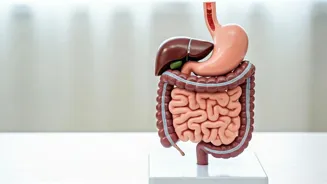The Speed of Eating
The pace at which you consume food can significantly impact your health, sometimes in ways that aren't immediately obvious. Eating too fast prevents your body
from properly registering when you're full, leading to overeating. This can result in weight gain and increase the risk of various health problems, including digestive issues. When we eat quickly, we tend to take larger bites and chew less thoroughly, which burdens the digestive system. Your body may not have enough time to release the hormones that signal satiety, which tells you to stop eating. Consequently, it is easy to consume more calories than you need, which can contribute to weight gain and related health conditions. Furthermore, the rushed nature of fast eating often leads to less mindful eating. Distractions, like watching TV or working, can further compound the issue, as they prevent you from paying attention to your body's hunger and fullness cues.
Long-Term Health Risks
Consistently eating at a rapid pace may have long-term health consequences that develop over time. One notable risk is an increased likelihood of obesity. Overeating, prompted by a lack of awareness of fullness cues, leads to excessive calorie intake. This, in turn, contributes to the accumulation of body fat, increasing the chances of becoming overweight or obese. Moreover, there's evidence that eating quickly can adversely affect metabolic health. Studies have shown that people who eat fast tend to have a higher risk of developing metabolic syndrome, which includes conditions like high blood pressure, elevated blood sugar levels, and abnormal cholesterol levels. This syndrome heightens the risk of heart disease and type 2 diabetes. Chronic diseases also become more likely. The combination of overeating and poor digestion can contribute to chronic inflammation in the body, laying the groundwork for chronic diseases. Such habits can also impact mental health, as individuals who consume meals in a rushed manner may experience increased stress and anxiety around mealtimes.
Eating Habits Strategies
Implementing some conscious strategies can dramatically improve your eating habits, ultimately impacting your health. One key strategy is to slow down and practice mindful eating. Instead of rushing, try to savor each bite. Pay attention to the flavors, textures, and aromas of your food. Chew each mouthful thoroughly, allowing your body time to register the signals of satiety. Creating a calm and distraction-free environment can also support healthy eating. Minimize distractions like TV, phones, or work during meal times. This allows you to concentrate on the eating process and better recognize your body's signals. Using smaller plates can help control portion sizes, making it easier to eat at a moderate pace. Larger plates can trick the mind into overeating because the portion appears less generous. Pausing between bites can also be useful. Put your fork down after each bite and take a moment to breathe and appreciate the food. This promotes a more relaxed eating pace and gives your body time to signal that you are full. Planning meals and snacks in advance can also help. Preparing your food ensures you have healthy options and reduces the temptation to grab a quick, unhealthy meal.













